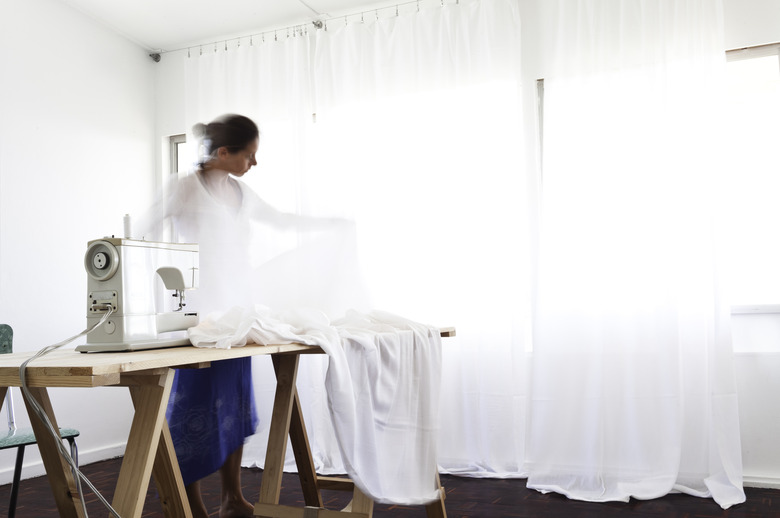What Fabric Should I Use To Line Curtains?
We may receive a commission on purchases made from links.
Lining curtains is an important step in creating homemade window treatments. Comparing the curtain liner options helps you choose the material that's best suited for your needs. From blocking light to protecting your curtains, curtain liners can serve many functions for your curtains or drapes when you choose the right fabric.
Tip
Common fabric types used to line curtains include cotton, polyester, or a cotton-polyester blend. Specialty blackout lining contains a thin layer of foam to help block light and add more insulation to your curtains.
Importance of Curtain Liners
Importance of Curtain Liners
Adding liners to your curtains or choosing lined curtains offers many benefits, both aesthetic and functional. Knowing which benefits you want can help you choose a fabric that best achieves those results. Reasons to add curtain liners include:
- Durability: The lining increases the durability of the curtains by protecting them from UV rays. Lining fabric also minimizes fading, which keeps your curtains looking new for longer.
- Insulation: Another layer of fabric adds a little bit of insulation to your windows, which can help control the indoor temperature. Choosing a thermal or blackout lining adds even more insulation.
- Improved draping: Added body and weight from the fabric liner gives your curtains more structure and helps them drape better. It can also help the curtains hold pleats better.
- Blocking light and privacy: All types of lining darken your room somewhat. The extra layer of fabric creates a darker space, which is beneficial at night. It also adds another layer of privacy.
- Moisture protection: If you have condensation issues on windows, moisture-resistant linings can protect your curtains from the dampness. This can help prevent mildew growth and water stains.
What to Look For
What to Look For
If you're lining curtains to hang in your home, you should look for liner material made from 100 percent cotton, polyester, or a combination of the two. Curtain liners designed for use in the home are created to repel water, resist stains, provide insulation, and prevent ultraviolet rays from entering the home. If you're creating curtains for a commercial business, you'll need liner material that has been treated with fire retardant to meet fire codes.
Specialty Curtain Liners
Specialty Curtain Liners
If the curtains will be hung in a bedroom or a living area that receives too much afternoon sun, you may be interested in specialty blackout linings. These linings are created to prevent light from entering the room through a construction of a poly/cotton base cloth and acrylic foam that is attached to the window-facing side of the draperies. The thickness of blackout linings gives them the added benefits of both temperature and noise insulation. You can get separate blackout curtain liners that hang on the curtain rod behind the curtain with no sewing required.
Well-insulated curtains can go a long way toward creating an energy-efficient home. All types of curtains provide a certain level of insulation, but if your goal is to increase your home's insulation, you'll want to choose a thicker liner fabric. Adding insulated curtains can more than double the efficiency of the windows in your home and significantly reduce your heating and cooling costs.
Other Curtain Liner Considerations
Other Curtain Liner Considerations
Before you decide on a liner fabric, make sure that the fabric is similar to your face fabric in construction and care instructions. When hung together, you want your curtains to have a unified look and hang correctly. Care instructions are important so that both the curtain and the liner can be cleaned the same way without ruining either of the fabrics. If one fabric needs to be dry cleaned, make sure the other can be dry cleaned too.
Other factors to consider depend on where the curtains will be hung, as draperies in different rooms will have their own needs. While noise and light control might be your first priority in the bedrooms, you'll want stain-resistant, easy-to-clean fabrics for kitchen window treatments, where spills and splatters are common. Protection from ultraviolet lights is important in rooms that receive full sunlight or for curtains that are made from light-sensitive materials.
